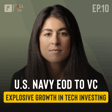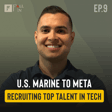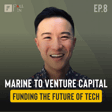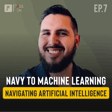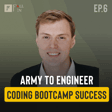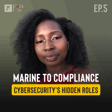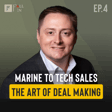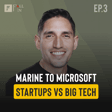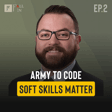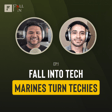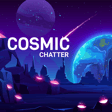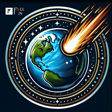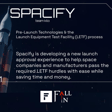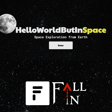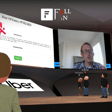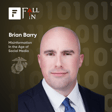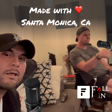Introduction to Paul and Team Insane India
00:00:01
Speaker
All right. Welcome everyone to the Paul in podcast. Uh, we're here with, uh, team leader for team insane India and Nika, why don't you go ahead and, uh, you know, tell us a little bit about yourself and your background, your military background, if you want to go into that. And, um, yeah, I think that would be a great start.
Nika's Background and Transition to Tech
00:00:30
Speaker
hi. Okay, so my name is Nika. I am a vet and a military spouse. I was in the United States Air Force. I did a couple of different jobs. One was electronics engineering. And my second job was med tech, which led me into a civilian sector of healthcare, where I have worked as an EMT, a medic, and then I
00:00:59
Speaker
got my registered nurse. And I have done that for a few years. That's my last major job was doing nursing. And I did love it because I loved helping people. But it was time for me to find something new. So I took some time off, raised some kids. And my husband is actually active duty right now. He came back in. He was also that he decided to come back in. And so yeah, I wanted something different. And
00:01:28
Speaker
It led me into software engineering. And I just recently graduated from a bootcamp called Code Platoon. And yeah, that's a little bit about me. Nice. Yeah, sounds like a pretty big career change from nursing and the medical field into something like tech.
Journey Driven by Creativity
00:01:50
Speaker
What would you say was the primary factor for coming into tech?
00:01:55
Speaker
I know you said you wanted something different, but what was it about tech that made you want to enter it? Yeah, that's actually a really good question. I kind of fell into it a little bit. And the reason why is I had signed up a couple of my kids for a small introduction to coding class. And while they were learning, I'm listening to the instructor. And they started talking about HTML. And I was like, what is that?
00:02:25
Speaker
I don't know what that is. So I started looking it up and researching and started playing around and I was like, oh, this is a lot of fun. Like I can think of anything that I want and I can essentially build it, you know? And I really enjoyed that aspect because when you are in the healthcare sector, unless you're a doctor who is, you know, they're trained differently, the nurses of course, and they're able to be
00:02:55
Speaker
much more creative in some of their solutions that they might have to helping a patient. Whereas with nursing, because it has to be, it's highly regimented. You have to be very careful about what you do and what situation. And you cannot be as creative, right? Which makes sense because you're dealing with people's lives.
00:03:25
Speaker
I totally understand that, but I have this need to be creative and I did not feel like nursing was able to fill that need. And so I literally did go on a journey. I went looking in so many different places and I never considered myself a technical minded person that was more like my husband. And so when I fell into it and I realized that I really enjoyed it,
00:03:55
Speaker
And that it could potentially be something that I do as a career. I just tried super hard and the more I tried, the more I learned, the more I loved it. And yeah, that's why I even started this journey. That's so cool. Yeah, I really like the fact that you actually like learning it. And I think so many people joined the industry for
00:04:21
Speaker
so many other reasons and they forget that, you know, you got to like what you're doing. Yeah. And, you know, you're going to be doing it for several hours during the week, during the day. And so, yeah, it's a really inspiring story, actually. Oh, thanks. I think I think just learning and my love for learning period helps a lot because I do. I enjoy the process of learning something. So I think that I think that's really key. Yeah.
00:04:51
Speaker
Definitely. Yeah. I think, you know, like I graduated college and I thought learning would stop, but here we are today constantly, constantly learning. It doesn't end. No, it doesn't. But it feels great. And just to get that flow of always learning and, you know, there's like a happiness to it.
Hackathon Project: Equine Therapy for Veterans
00:05:14
Speaker
You know, speaking of creativity, you know, our hackathons are online. It's using a
00:05:20
Speaker
creative platform. You attended our previous hackathon last year. Can you tell us a little bit about the project? I know you guys won first place last year. If you want to touch a little bit about about that project, and then we can dive into this year's project as well. Yeah, so last year, that was the first time I had ever had ever even heard about a hackathon, let alone
00:05:48
Speaker
join one. And I was like, I have no idea what I'm doing. What in the world is happening? And, but I'm glad that I did because I got to work with an amazing group of people. Our, our team lead, Greg, phenomenal, great team leader. And from the get go, he was like, Okay, these are all the things that we need to do. And we really need to come up with a great
00:06:17
Speaker
idea and collaborate together. And it was just, it was very, just a very free flowing environment of ideas. And then once we decided to settle on the equine therapy for veterans, it was like, okay, we've, we've got an idea, now we just need to run with it. And I will say, from the time that we did that to the very end, I felt like, yeah, I may not have really been able to
00:06:46
Speaker
bring as much to the coding aspect of it, but I still felt just as much a part of the team as doing it this year, where I actually was able to really commit things to the code base this year. So I think just having people that were very engaged was super, super important in us being able to have a win last year.
00:07:15
Speaker
And could you give a brief description of what the project entails for last year? Yes. So it's an equine therapy application. So basically what happens is when you're going into look for therapy in the VA, a lot of things don't actually talk to each other. They're not connected. And so you could conceivably be looking for something and not even know that you have some of these programs that could
00:07:45
Speaker
be very close to you. And so our idea was we want to be able to have all these siloed off therapists be able to be connected together and being able to do that, you're literally able to go into the application and say, okay, this is where I'm at. And it gives you a map of view
00:08:13
Speaker
of the services that are nearby you. And what we wanted to do as a future feature was to be able to have it be easier for the therapy providers to be able to fill out all the paperwork and stuff right there in the application because we know that is a major source of friction for being able to get those services to veterans. So it was very cool.
00:08:43
Speaker
being able to do some scraping and database and API involvement. It was very, very cool to be able to see something come together that's going to end up helping our brothers and sisters in arms. I think that's really cool. It was very exciting. Yeah, I was super impressed with the project you guys did last year. And the hackathon in general, we had Andrew Bustamante, I believe,
00:09:12
Speaker
that came in as our speaker. He's been blowing up on socials and I think we were just super lucky to have him come in and talk about how mental health kind of correlates with national security and all that sort
Hackathon Project: Agriculture in Space
00:09:28
Speaker
of stuff. But diving back into this year's hackathon, which was around space, the one question I have is what inspired your team to focus on agriculture in space?
00:09:42
Speaker
particularly in LEO, low earth orbit. Yeah. So, you know, we had a lot of ideas, but it was kind of difficult for us to be able to conceptualize how we could actually try to solve a real world problem. That was something that was really, really important to us as a team. And I think also because most of us just graduated from boot camp. So there's that.
00:10:11
Speaker
And this was a first hackathon for everybody else except for me. And so we all needed to be able to latch onto an idea and understand fundamentally what we're solving. It's never helpful for us to have something that's just so abstract that we can't wrap our minds around it because then when it comes to actually implementing that,
00:10:40
Speaker
we're going to flounder. And so it's pretty easy for us to understand everybody's got to eat, even when you're in space. And we know that things that are not packaged are actually healthier for you, plants and whatnot, fresh fruit, fresh vegetables, not things that are pre-processed. Those things are better optimally for our function as human beings.
00:11:09
Speaker
And so our idea was what if we can take those things that we've learned in agriculture here on earth and our ecosystem and then be able to take that and optimally grow those same plants in low earth orbit. And what our thinking was, if we're able to do that, you can take those concepts that you learn and apply them when you're out in deep space or
00:11:39
Speaker
potentially apply them when you're on another planet, for instance, like Mars. We all need to be able to eat. It's a core function of our being able to stay alive. So that was a pretty simple, not a simple solution, but a simple idea for us to be able to rally around. So how did you determine the optimal growing conditions for the 12 fruits and vegetables that's featured in your
00:12:06
Speaker
Yeah, so we did have to do some research on what are those optimal solutions for getting the most out of each of those plants. And then it's interesting, there was actually in NASA, they have information because they've been tapping into experiments and research that the entire world is doing.
00:12:37
Speaker
I thought this was really interesting. A lot of it is actually coming from grade schoolers. So you're talking middle schoolers, high schoolers. I thought that was really, really cool to be able to take some of that grassroots research and experimentation from today's next generation and to be able to apply it for those people that are coming behind us. I think that was really, really cool.
00:13:06
Speaker
to be able to see that it's not just scientists in the lab. It's like real world stuff that's happening that they're trying to use to be able to make that become a reality. So it was pretty interesting. Yeah, that's pretty wild.
Technical Details and Practical Applications
00:13:25
Speaker
I want to dive into the technical parts a little bit. Can you explain the process of using some of the APIs? And if you can name some of the APIs that you use to gather
00:13:37
Speaker
data on the plant requirements. That'd be great. Yeah. Yeah. So one of them was, I hope I'm saying it right trefully. I think that's how you say it. T-R-E-F-L-E, if I'm not mistaken. That was one which has a giant repository of information. And another one, I believe it's called FarmCC, if I'm not mistaken. We had quite a few others, but because we were under such
00:14:07
Speaker
a short amount of time for the deadline, we decided to go with those two just because it was something that we felt that we could query that API and get back some actual useful information that we could apply to the application. Unfortunately, we weren't able to take it as far as we wanted. We just ran out of time. Our runway was super, super short. Yeah. From a practical application perspective, how do you see
00:14:37
Speaker
astronauts in space utilizing the app to plan their space agriculture projects? Yeah, I think that something that would be really, really cool is to be able to take computer vision, which is something that AI is continuously pushing forward to be able to see better.
00:15:05
Speaker
And for you to literally be able to watch how the plant is growing, and then to be able to take that information and say, okay, if it's doing, let's say it's maybe not as growing in this optimal condition that you want, and to be able to say if it's doing XYZ, then maybe it needs more nutrients. Maybe it needs more light.
00:15:34
Speaker
maybe it needs more water. And our thinking was if we could do that and be able to watch it, an astronaut would be able to immediately kind of like get almost like an alert, hey, this plant needs this. Because sure, an astronaut could sit there
00:16:00
Speaker
and try to figure all that stuff out on their own. But if we're able to reduce the cognitive load, that frees them up to do other things and it makes their life easier. And if in the future you're doing space exploration with a whole colony of people and it's something small that we can offload, they're able to do other things that might be more pressing or
00:16:30
Speaker
or help their colony be able to thrive in other ways.
Surprising Findings on Plant Growth in Space
00:16:34
Speaker
And so I think that would be a really cool thing to be able to do ultimately. Yeah, that's so awesome. And I think as space, the ecosystem gets developed. I've been hearing a lot about commercial space, getting more attention. It sounds like we're
00:16:58
Speaker
going to have more astronauts, whether they're like by NASA or governments or again, commercial civilian, there's gonna be this like huge market. And obviously, there needs to be some mechanism involved for like healthy eating, right? It's so crazy to even talk and think about this. But what was some of the more interesting and surprising findings that you
00:17:24
Speaker
had discovered about plant growth in space as you were doing research for this hackathon project. I could give you one example that I don't think that we really expected something that was really interesting. They had taken wheat and they had decided to grow that in the ISS in low earth orbit.
00:17:54
Speaker
International Space Station. And when they did it, they actually found that the wheat grew like 10% taller than it does an Earth. And that's not something that you never naturally would think, oh, yeah, that that's going to happen. But then when you're looking at it, the fact that, oh, OK, it doesn't have the gravitational limits on it because the gravity is going to be less.
00:18:21
Speaker
And so it's just really interesting when you get to see how plants are reacting because all we're used to is the ecosystem of Earth. And so then it kind of like makes you start thinking, oh, what other things might be possible about plants? Is it possible that plants are actually going to proliferate even more
00:18:50
Speaker
and low Earth orbit than they would on Earth, which I thought would be the complete opposite. And so it's very interesting when you start thinking about those things because anything's possible, right? And it kind of like takes you back to being a kid when you believe literally anything is possible. And I think we kind of lose that as adults. So it kind of takes you back to that childlike wonder and imagination, which I think is super cool.
00:19:20
Speaker
Yeah, that is really cool.
Facing Challenges and Leadership in Hackathons
00:19:23
Speaker
What would you say were some of the challenges that your team faced while building this app? And how did you guys overcome those challenges? I know there were some friction in the beginning and there might've been some technical challenges, but yeah, would love to hear from your end. Yeah, it's interesting. I will be honest, when I went into this, I was like, okay, I'm just, I'm going to be here.
00:19:48
Speaker
and I'm gonna help and it's gonna be great. And I found that because I've done this at least once before that people were kind of looking for my insight and I wasn't necessarily expecting that. And so I felt like at a certain point I was obligated
00:20:18
Speaker
And that's not in a bad way. I don't mean that in a bad way at all, but obligated to inform my teammates as much as I possibly could so that we can at the very least be able to have something to show for our work and to not flounder as much. And so I ended up having to do some leadership
00:20:46
Speaker
some leadership roles that I wasn't intending on doing. And that really, that really did stretch me a lot, like a lot because I'm just coming out of a bootcamp, you know, I would, I felt like I would not be the best person to lead because I didn't have any real world experiences as a software engineer. But I find that that's okay.
00:21:14
Speaker
that we don't have that. And maybe we don't need to be so hard on ourselves. We still can lead even if we don't have that real world working experience, as long as we're willing to try. And I think it was really cool to be able to see everybody start collaborating more and say, Oh, okay, I'm having this issue. Do you think that you could help? Or, Okay, I'm done with this. What else needs to be done? And to just
00:21:44
Speaker
be able to delegate and kind of keep my fingers in everything. It basically ended up being, I think personally, an exercise in project management. And it was difficult, I won't lie, but I learned a lot. I learned a lot. Well, that's great that you learned a lot. I think when it comes to our hackathons, that's catered to veterans. I wanted to create an environment where people
00:22:13
Speaker
can make mistakes and just experiment and because you don't have the luxury to experiment and make mistakes in other places like at a job.
Growth and Learning through Experimentation
00:22:24
Speaker
And so I wanted this place to be like almost like Play-Doh. You just like go in and try to make something, create crumbs, create, you know, break things and
00:22:37
Speaker
you know, say things that doesn't flow or doesn't make sense. But this is the environment to like, exercise all your different skills to help you grow and learn. And I'm really glad that you guys came out with the finished product. And I mean, it was really it's true. It was a project like like nothing else I haven't heard of, which is really cool. Right. So yeah, kudos. Kudos to you guys again.
00:23:07
Speaker
I have a couple more questions, but one that I have is if you could collaborate with any space agency or organization to further develop the app, who would it be and why? I would do it with ISS only because they're already collaborating with everybody in the world, right? I think that
00:23:32
Speaker
not just focusing on a certain core group of people and expanding that to include other people that may not even necessarily think like you, may not even necessarily have the exact same values as you, gives you a different point of view that you may not have even entertained before. And so like for me, that's an easy answer. Definitely ISS because they're already doing it, right? And they're already learning how to collaborate
00:24:00
Speaker
no matter where someone's coming from. I think that there is a lot of value in being able to get information from other people that are willing to push back on you. We don't need to be surrounded by people that are just going to agree with us. We need to be around people that are going to disagree and to give us good alternative reasons as to why. I think those things are important. Awesome.
00:24:32
Speaker
Yeah, as we wrap up here, do you have any favorite space movies or shows or books that you want to give a shout out to?
Favorite Space Media
00:24:42
Speaker
I don't know what your level of interest in space is. Some people are like super fanatic, some people are like super foreign. But yeah, I would love to hear what you think about. Yeah, yeah, yeah. I would not consider myself a fanatic. I would say that I am a fan.
00:25:02
Speaker
You know, I grew up watching Star Trek with my family, right? And that includes all the old ones too. We enjoyed that. My mom loved sci-fi. Like that was something she really enjoyed. And that really, I think that rubbed off on me. And so one thing I will say is I absolutely love Dune. And I'm not saying I love Dune because of the new ones. I've watched the old ones before.
00:25:30
Speaker
More importantly, if you love Dune, the movie, you will love the books. Absolutely, hands down, love the books. So that's what I like. Cool. Yeah, and then do you have any tips for anyone that might be thinking about joining our future hackathons?
Advice for Future Hackathons
00:25:53
Speaker
And then do you have any advice for us as well on how we can improve
00:26:00
Speaker
So I would say if you're thinking about doing a hackathon, especially if you're a veteran or military spouse, I would definitely go to this one. Yeah, it might be biased because this is my second year. If I came back, obviously I liked it. I plan on coming back again next year. I think that because of the nature of what you're building and it being open, just like you said earlier,
00:26:28
Speaker
and that you're not going to be restricted in what it is that you end up doing and that even if you make mistakes, it's okay because it really is a learning environment. We need to have those places where we can make mistakes and it's, you know, they're low stakes, right? Like you said, you don't want to do that when you're at work. But I would definitely come back and I would tell people to come with an open mind, especially if you haven't
00:26:57
Speaker
done a hackathon before, and it might be kind of uncomfortable at first because you're going to be like, oh, I don't have somebody putting something in front of me that says I need you to do ABC. You have to formulate the idea yourself. And then when you come up with the idea, you've got to be able to delineate step one, step two, step three. And that can be, I think, very uncomfortable for people because
00:27:28
Speaker
It's like playing an open world game. You can go anywhere. And so you've got to be able to define the limits of what it is that you're doing and have the correct amount of scope so that you can find to be able to make the final product in the end. And so I would say go for it. Do it. It's going to be new. It might be uncomfortable, but I think that you're going to find that you learn a lot more about yourself than when you started it.
00:27:56
Speaker
So I think everybody should do it. I really do. That's awesome. And then do you have any advice for us on how we can make the event better? Yeah, anything around that? Yeah. Something that I would say is push it even more. Share it even more. Because I don't know where I've heard this before, but I think I've heard it said that people need to hear things seven
00:28:26
Speaker
five to seven times before they actually take some sort of action on that. And I've had, I've had somebody in my past say, if you don't get to the point when you're sharing something that you're sick and tired of hearing yourself talk about it, then you're not sharing it enough. So if you guys aren't at that point, I would say, I would say share it even more because I, I was able to share with my Code Platoon classmates
00:28:55
Speaker
And they were like, oh, this is really cool. And I had to say it a couple of times. But then they got really excited about it. And people won't sign up if they don't know. So that's super, super important. And the other thing I would say is maybe give a little bit more time to allow people to be heads down. Because I do know sometimes it might feel like
00:29:22
Speaker
okay, we've got this speaker and we've got this speaker and we've got this thing and we've got this thing and people are like, oh wait, I have to go to all that stuff and I have to code. So yeah, maybe just tailor that back just a bit and allow people to have more heads down time. But yeah, I think you guys are doing a great job overall. I really enjoy it. I really love the speakers that you have. And I think that I love seeing your heart be in this, that it's important to you and that you have a lot of passion for it.
00:29:52
Speaker
And it comes through. Thank you so much. Yeah. I will take that into account. For some reason we got super speaker heavy this past I thought it was just like, it was, it was, they were really awesome. They really were very interesting. So yeah, I think we're just trying to fit a lot into this, uh, into this pan, but yeah, thank you so much. Is there anything else you want to give a shout out to anything?
Shoutouts and Upcoming Project: Storyline
00:30:21
Speaker
personal shout outs or anything. I know some folks have given shout outs to personal projects that they're working on that they're trying to promote, but leave it open to you if you want to close it out with anything you want to promote. Yeah, so I actually would like to give a shout out to Code Platoon because if it was not for Code Platoon and me being able to get in,
00:30:46
Speaker
I would not even be able to take the next step in my journey that I'm about to take. So super grateful for them. Shout out to my many, many mentors. I have surrounded myself with many mentors, my first one, and tech being Arete. She's known as a queen spicy auntie, I think, on Twitter or X. She has been awesome. She has given me such
00:31:16
Speaker
wonderful, timely advice when it comes to how to navigate the technical landscape, the things that hiring managers are looking for, those positive signals that they need to see from somebody that they might potentially be hiring. And she has a really great community called the Areet Dev Circle. Another one is Code Connectors.
00:31:45
Speaker
All of those guys are great, JC, Lawrence, Dennis, Eric. I feel like I'm going to forget somebody. Joseph, they have been phenomenal. They're working software engineers. They give so much time. They don't ask for anything back. They just do it because they love helping people. And that is so attractive, especially
00:32:12
Speaker
to people that are trying to become software engineers. So I would definitely go to Code Connector. I think it's Code Connector.io. I could be wrong about that. Look them up, join their Slack community. You will not be sorry that you did it. And then the last thing is I am slowly but surely working on something called Storyline, which I want to be able to basically help children
00:32:40
Speaker
come up with these stories and images and to make a little book. And hopefully I can get it to the point where then they get shipped the book out at the end. So they get to do something digital and bring it into real world and have something that they can hold in their hands. I think that it's really cool. I'm looking forward to it. It's a labor of love. And so it'll be a while till I'm done. But I'm just going to keep working on it one day at a time.
00:33:11
Speaker
Awesome. Yeah. Please keep me posted when that comes out. I'd love to check it out. Sounds really cool. Yeah. Thank you again for your time, Mika. And I think this has been great. Just hearing a lot about your project and, you know, your endeavors and again, want to congratulate you on your next chapter of getting into this internship. It's technical and it sounds like it's going to be a great growth opportunity for you.
00:33:40
Speaker
And hope we can continue to stay in touch. Yeah, definitely. And thank you so much. I appreciate the time, Jamil. Of course. All right, everyone. That's the pod.

